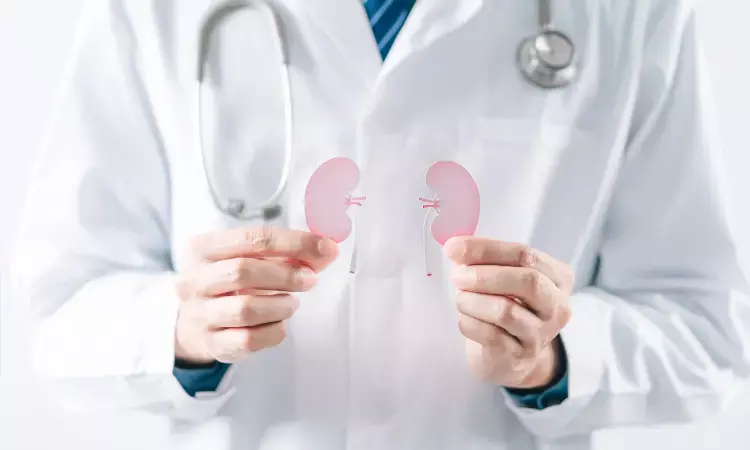- Home
- Medical news & Guidelines
- Anesthesiology
- Cardiology and CTVS
- Critical Care
- Dentistry
- Dermatology
- Diabetes and Endocrinology
- ENT
- Gastroenterology
- Medicine
- Nephrology
- Neurology
- Obstretics-Gynaecology
- Oncology
- Ophthalmology
- Orthopaedics
- Pediatrics-Neonatology
- Psychiatry
- Pulmonology
- Radiology
- Surgery
- Urology
- Laboratory Medicine
- Diet
- Nursing
- Paramedical
- Physiotherapy
- Health news
- Fact Check
- Bone Health Fact Check
- Brain Health Fact Check
- Cancer Related Fact Check
- Child Care Fact Check
- Dental and oral health fact check
- Diabetes and metabolic health fact check
- Diet and Nutrition Fact Check
- Eye and ENT Care Fact Check
- Fitness fact check
- Gut health fact check
- Heart health fact check
- Kidney health fact check
- Medical education fact check
- Men's health fact check
- Respiratory fact check
- Skin and hair care fact check
- Vaccine and Immunization fact check
- Women's health fact check
- AYUSH
- State News
- Andaman and Nicobar Islands
- Andhra Pradesh
- Arunachal Pradesh
- Assam
- Bihar
- Chandigarh
- Chattisgarh
- Dadra and Nagar Haveli
- Daman and Diu
- Delhi
- Goa
- Gujarat
- Haryana
- Himachal Pradesh
- Jammu & Kashmir
- Jharkhand
- Karnataka
- Kerala
- Ladakh
- Lakshadweep
- Madhya Pradesh
- Maharashtra
- Manipur
- Meghalaya
- Mizoram
- Nagaland
- Odisha
- Puducherry
- Punjab
- Rajasthan
- Sikkim
- Tamil Nadu
- Telangana
- Tripura
- Uttar Pradesh
- Uttrakhand
- West Bengal
- Medical Education
- Industry
Highly calcified Suprarenal aortic atheroma associated with AKI after transcatheter aortic valve replacement

Italy: A study published in the International Journal of Cardiology has concluded that Suprarenal aortic atheroma, when highly calcified, is associated with Acute kidney injury- transcatheter aortic valve replacement or AKI-TAVR. The researchers said that patients at high risk of AKI-TAVR could be identified by Perioperative-MSCT assessment of aortic atherosclerosis and can be benefitted from higher peri-operative surveillance.
Acute kidney injury (AKI) may complicate transcatheter aortic valve replacement (TAVR). This could be related to atheroembolization associated with catheter manipulation in the supra-renal (SR) aorta.
Researchers in the present study determined the impact of SR aortic atheroma burden (SR-AAB) and composition, as well as of the aortic valve calcium score (AV-CS), measured at pre-operative multislice computed tomography (PO-MSCT), on AKI-TAVR. They subcategorized calcified plaque into three strata: low- (351–700 HU), mid- (701–1000 HU), and high‑calcium (>1000 HU, termed 1 K-plaque).
The study results could be summarised as follows:
- Researchers included 222 patients with a mean age of 83.3 ± 5.7 years. (TAVR patients).
- 42.8% were males.
- 67/222 patients constituting 30.2%, had AKI-TAVR.
- Patients developing AKI-TAVR had higher Absolute SR-AAB and %SR-AAB.
- Patients who developed AKI-TAVR had higher mid‑calcium and 1 K plaque. They had no difference in AV-CS (p = 0.691).
- There was an increased risk of AKI when the %SR-AAB is >15.0% and the %SR-calcified plaque is >7.0%.
- %SR-AAB [OR 1.12] and %SR-calcified plaque [OR 5.60] had associated with AKI-TAVR.
We identified %SR-AAB >15.0% and %SR-calcified plaque >7.0% as optimal thresholds for predicting increased risk of AKI-TAVR from 3-knots spline analyses.
The study highlighted the usefulness of 3-dimensional multislice computed tomography in pre-TAVR evaluation.
The researchers in this study found higher supra-renal aortic atheroma burden (SR-AAB) and calcified plaque in AKI patients.
Further reading:
Supra-renal aortic atheroma extent and composition predict acute kidney injury after transcatheter aortic valve replacement: A three-dimensional computed tomography study.
BDS, MDS in Periodontics and Implantology
Dr. Aditi Yadav is a BDS, MDS in Periodontics and Implantology. She has a clinical experience of 5 years as a laser dental surgeon. She also has a Diploma in clinical research and pharmacovigilance and is a Certified data scientist. She is currently working as a content developer in e-health services. Dr. Yadav has a keen interest in Medical Journalism and is actively involved in Medical Research writing.
Dr Kamal Kant Kohli-MBBS, DTCD- a chest specialist with more than 30 years of practice and a flair for writing clinical articles, Dr Kamal Kant Kohli joined Medical Dialogues as a Chief Editor of Medical News. Besides writing articles, as an editor, he proofreads and verifies all the medical content published on Medical Dialogues including those coming from journals, studies,medical conferences,guidelines etc. Email: drkohli@medicaldialogues.in. Contact no. 011-43720751


